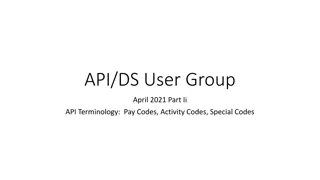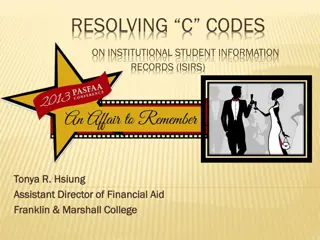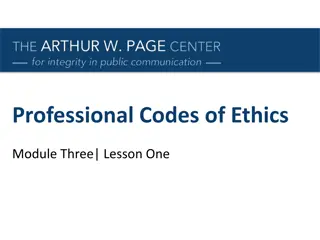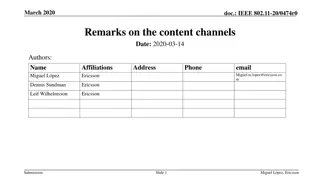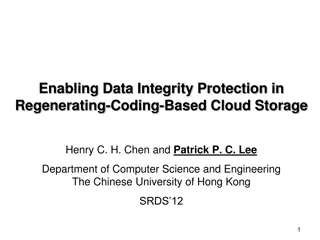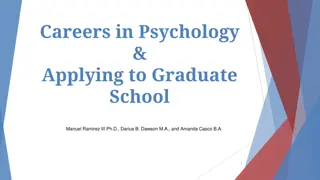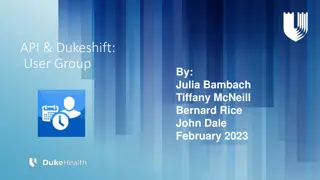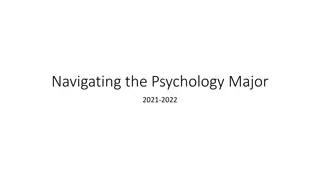Ethical Considerations in School Psychology: Navigating Codes and Principles
Explore ethical considerations in school psychology, encompassing ethical codes, legal requirements, and professional principles to address dilemmas and promote integrity. Gain insights into key ethical codes, legal mandates, and overarching ethical principles relevant to school psychologists' practice.
Download Presentation

Please find below an Image/Link to download the presentation.
The content on the website is provided AS IS for your information and personal use only. It may not be sold, licensed, or shared on other websites without obtaining consent from the author. Download presentation by click this link. If you encounter any issues during the download, it is possible that the publisher has removed the file from their server.
E N D
Presentation Transcript
Putting the Pieces Together: Ethics, Law, Best Practice and Procedures in School Psychology Laurie McGarry Klose, PhD, LSSP RespectED: Educational Consultation, Advocacy, and Evaluation San Antonio, TX
Practice using a problem-solving model to address ethical issues. Practice Learning Objectives Discuss and examine Discuss and examine various sources of influence that can contribute to ethical dilemmas, particularly related to equity, access, social justice and anti-racist policies and actions. Integrate accepted and evolving standards and principles pertaining to different scenarios in the current school and community environments. Integrate
Although I am the Past President of NASP and former chair of the NASP Ethical and Professional Practices Board, individual professional opinions and information presented in this session are my own. Although I occasionally write and publish about ethical and professional practices, I am not promoting my own work today. Please note I am not an attorney; my opinions should not be regarded as legal advice.
Ethical Codes- for school psychologists and other educational professionals Legal Requirements- FERPA, IDEA, ESSA, credentialing requirements, state education laws and regulations, etc. Local Policies and Procedures Parameters
National Association of School Psychologists Principles for Professional Ethics (NASP, 2020) provides four general themes: Respecting the dignity of all persons, professional competence and responsibility, honesty and integrity in interpersonal relationships and responsibility to schools, families, communities, the profession and society. Primary Ethical Codes Relevant to School Psychologists The Ethical Principles of Psychologists provided by the American Psychological Association (APA, 2003, 2010, 2017) provides five general ethical principles: Beneficence and non-maleficence, fidelity and responsibility, integrity, justice and respect for people s rights and dignity. The International School Psychology Association (ISPA) created a code of ethical principles that attempts to define general principles that span international, cultural, linguistic and legal contexts. The general tenants of the ISPA ethical code include general principles related to trust, promotion of children s welfare, and high levels of professional competence (ISPA, 1990).
Composed of broad, abstract principles as well as specific mandates Ethics codes are imperfect guides for professional conduct Competing ethical principles or conflicts between ethical principles and laws or regulations Conflicting interests of multiple parties (e.g., student, parents, classmates) Dual roles of employee and pupil advocate May not address new and emerging ethical issues in a timely manner
What are some pressing concerns school psychologist are talking about at the moment? Administrative Demands Competence Compliance Job Options/Burnout Equity
New( New(ish ish) Resources ) Resources NASP Ethics and Professional Practice Problem Solving Worksheet certification/professional-ethics/informal-ethical- problem-solving-of-colleagues-misconduct https://www.nasponline.org/standards-and- publications/resources-and-podcasts/covid-19- resource-center/webinar-series/legal-and-ethical- considerations-for-remote-school-psychological- services https://www.nasponline.org/resources-and- certification/professional-ethics/using-ethical- problem-solving-to-respond-to-racism-(webinars) https://www.nasponline.org/standards-and-
Using the Problem Solving Worksheet
Too Many or Not Enough? Ms. Logan started a new job as a school psychologist in large suburban district with a statewide reputation for having very high ratings on state assessment criteria. A few weeks into the school year, Ms. Logan noticed that approximately 70% of the referrals for initial evaluations for special education eligibility were for black students while the population of the school district included approximately 30% black students. When Ms. Logan approached her supervisor regarding this concern, the supervisor indicated that referral decisions are made at the campus level based on academic performance. Ms. Logan felt uncomfortable with this response and was unsure of her ethical responsibility with reference to these referrals and assessments.
1. Describe the situation and determine if an ethical dilemma exists. Describe the problem situation: Disproportionate number of referrals for special education for black students in the district. Does an ethical dilemma exist? Yes, Ms. Logan feels the district is unresponsive to the information regarding disproportionate referrals and suspects systemic racism. Competing values or priorities Competing views of best practice Policy and procedure adoption/implementation Other factors to consider Systemic issues related to discriminatory policies need to be addressed New employ status lessens impact of individual voice Need to maintain job and develop role as new sch psych Need to address campus level issues related to instructional interventions related to black students Compliance is primary consideration for admins Equity is primary consideration for school psych Policy regarding referral procedures have been in place since 2004 School attorneys must vet any changes to referral processes so that child find obligations are not violated Identify the broad ethical and legal issues pertinent to the situation. Based on the identified concerns, topics to research include: Legal Ethical Local policy/procedure Child find in IDEA Requirements for instruction prior to referral Social justice Appropriate evaluation procedures Referral procedures- official Referral procedures- unofficial Discrimination policy
2. Consult available ethical and legal guidelines. List the specific ethical standards that may relate to the situation. Standard I.3.1 Discrimination School psychologists do not engage in or condone actions or policies that discriminate against persons, including students and their families, other recipients of service, supervisees, and colleagues based on actual or perceived characteristics. Standard I.3.2 Correcting Discriminatory Practices School psychologists strive to ensure that all children and youth have equal opportunity to participate in and benefit from school programs and that all students and families have access to and can benefit from school psychological services. They work to correct school practices that are unjustly discriminatory or that deny students or others their legal rights. School psychologists take steps to foster a school climate that is supportive, inclusive, safe, accepting, and respectful toward all persons, particularly those who have experienced marginalization in educational settings. Standard III.2.3 Priority of Child Welfare The school psychologist s commitment to protecting the rights and welfare of children and youth is communicated to the school administration, staff, and others as their highest priority in providing services. School psychologists are ethically obligated to speak up for the interests and rights of students and families even when it may be difficult to do so. Standard IV.1.2 Promoting Systems Change School psychologists use their professional expertise to promote changes in schools and community service systems that will benefit children and youth and other clients. They advocate for school policies and practices that are in the best interests of children and that respect and protect the legal rights of students and parents.
List the specific federal statutes that may relate to the situation. IDEA requires that districts provide a free appropriate public education (FAPE) to students with disabilities. Under Section 504, FAPE is the provision of regular or special education and related aids and services that are designed to meet the individual educational needs of students with disabilities as adequately as the needs of students without disabilities are met and that satisfy certain procedural requirements related to educational setting, evaluation and placement, and procedural safeguards. Title VI of the Civil Rights Act of 1964 protects students from discrimination based on race, color, or national origin in connection with all academic, educational, extracurricular, athletic, and other activities of a school, including a school s effort to meet its obligations to students with disabilities under Section 504 or the IDEA. https://www2.ed.gov/about/offices/list/ocr/letters/colleague-201612-racedisc-special-education.pdf List the specific state statutes that may be related to the situation. State law and regulation connected to the requirements described above. List the specific local policies that may be related to the situation. District policies related to access to instructional intervention, referral for special education, interpretation of progress monitoring data, criteria/instruments used for generating referral for special education List the specific local procedures (both explicit and implicit) that may be related to the situation. Campus level procedures for implementing district policies. 3. Consider, to the best of your ability, all factors pertinent to the decision. Consider whether racial, ethnic, cultural, socioeconomic, and background factors are important to understanding the context and/or the individuals involved. Pause to examine your own biases and how they could affect your perception of the situation and your professional judgment. Racial issues appear to at the crux of this issue. Additional information regarding the history of racial inequality in the system would be helpful for a new employee when addressing this situation. Potential themes for reflection: Personal work related to anti-racism actions, experience with colleagues who exhibit racist behaviors in schools, personal experiences with discrimination
4. Confer with supervisors, colleagues, others. Source Identify administrative supervisor(s) to be consulted or trusted alternative with the authority to assist Administrative supervisor- Special education director Input Administrative supervisor is consulted for clarification regarding school policy and procedure related to special education referrals and monitoring of data related to rates of referral for minoritized populations. Identify clinical supervisor(s) to be consulted.- Lead school psychologist or trusted alternative with the authority to assist Discuss concerns related to unresponsiveness of administrator to data regarding disproportionality. Discuss role of school psychologist in referral processes. Discuss clinical concerns regarding appropriate instruments used during evaluation and ability to address rule out factors, especially when considering SLD identification and eligibility. Given the very specific and time sensitive nature of this situation, external professional support services were not deemed appropriate for consultation. Identify professional colleagues to be consulted.- Professional support group that has a private group chat to discuss professional issues Identify trusted colleagues and/or others (e.g., community leaders) who may be familiar with contextual variables (e.g., historical, economic, cultural, racial) fundamental to understanding the situation. Perhaps seek consultation with colleagues in the NASP communities who have addressed these issues in their schools Identify professional resources to be consulted. Resources on NASP website related to disproportionality and social justice IDEA.gov resources related to disproportionality
5. Evaluate the rights, responsibilities, and welfare of all affected parties. Party Self Rights To work in a system that protects the rights of all students and addresses injustices Responsibilities Advocate for social justice and recognize and address systemic issues that perpetuate discrimination towards groups of children Participate in educational opportunities to the best of their ability Welfare Address concerns that impact my ability to engage in professional practice in a legal and ethical manner Child Receive FAPE including special education and related services Equal treatment and absence of discriminatory, racist or unjust practices Understanding the potential outcomes of evaluations during informed consent process. Receive education in an environment free from racist procedures Parent Participate with school based team in making decisions regarding child s educational program Participate in child s education in an environment free from racist procedures Teacher Administrator Make decisions considering all parameters related to the educational system Ensure students from groups who have been minoritized have access their robust educational programming Service Provider Other
6. Consider alternative solutions and the likely consequences of each. Possible Solution Potential Positive Consequences Potential Negative Consequences Gather additional data related to special education referrals for different groups, schools, districts and present to administrator Increase awareness of data indicating disproportional referrals of black students Relationship between school psychologist and administrator is irreparably damaged School psychologist risks nonrenewal of contract Does not address specific concern regarding instructional issues prior to referral to special education Provide data for administrator to use in advocating for systemic changes related to referral processes Present data to school board meeting during public comments School board directs resources to assess causes for trends seen in the data Administrator feels betrayed School board does not understand or see the need for concern Present data to entire faculty at school where identified concern exists Problem solving can occur regarding accessing instructional supports Increase awareness of data indicating disproportional referrals of black students Individuals who most need to hear the information may not attend Offers a description of a problem without offering solutions Unclear the authority of faculty to make changes in procedure
7. Select a course of action and assume responsibility for this decision. Decision Having considered the rights and responsibilities of affected parties, Ms. Logan decides to do the research and present it to the administrator in an easily understandable, compelling format. Next Steps Collect and organize relevant data. Collect and summarize relevant literature related to disproportionality. Summarize successful efforts in other systems addressing these issues.
Life in the Fast Lane -The Eagles I am frustrated and at the end of my patience with trying to please both Special Ed and General Ed teachers and staff. I have several evaluations that have been requested to be expedited by the principal and regular education teacher(s). Two of these involve concerns related to possible autism eligibility and two are related to significant behavioral concerns. All students are in grades K-2. Related service providers (OT, PT, SLP, and ABA specialist- all campus based) are involved and have agreed with scheduling the students initial eligibility meetings as early as possible- read: well before the allowable timeline. But the General ED staff is still upset and wants these meetings to occur in approximately two weeks time. The principal also wants the process expedited even more so than it already is. I feel torn between what is appropriate, what is required, what is reasonable, and what is possible.
Law- Federal, State, Statutory, Case Ethical Principles Procedures- Formal/Informal Best Practice
This is a first for me. I met with a parent in my office to go over the consent for evaluation, which they signed. Everything seemed fine with the parent showing no concerns or discomfort with the process. Two days later, the principal called me into their office to inform me that the parent had sent a letter to formally request that their child not work with me nor be seen in my office space. The parent continued that my wall decorations, including an ally poster, a poster promoting multicultural celebration, and available handouts relating to sexual identity, gender inclusivity, and teen pregnancy resources, were offensive to them and not something they wished their child to see. In the letter, the parent indicated they still wanted to the evaluation, just not completed by me or in my office. Signs -Five Man Electrical Band
I am conflicted about how I handle sensitive family information in a report when several family members are employed by the district (grandmother is a campus vice principal, uncle is a middle school coach, cousin is a preschool instructional assistant). I have several relevant factors that I feel are important to include in the report, including family history of similar concerns that the student that I assessed in demonstrating. However, the information in this case is quite sensitive related to mental health and other issues. I am concerned that even a general statement compromises the privacy of a close relative working in the student's school. The referral concern was academic, and the student meets criteria as having a specific learning disability, however, circumstances at home do affect emotional and behavioral functioning and academic engagement. I'm uneasy about leaving out information that could be relevant to understanding their support needs. Keep the Family Close -Drake
Frequently when I am asked to conduct a risk assessment (either for self harm or for threats toward others), a guidance counselor or nurse is present with me, sometimes assisting in the assessment, sometimes just being present. I am a bit unclear related to confidentiality in these situations. A plan to hurt one s self, hurt someone else or revelation someone is hurting the student being evaluated, clearly exceed the boundaries of confidentiality. However, other facts, issues, concerns frequently arise in these situations. I am not sure how to address the confidentiality, particularly with the other professionals present, of these other concerns. are the things discussed still confidential or is that void because there is someone else in the room. A Matter of Trust -Billy Joel
Over the Rainbow Dorothy Gale I am having a hard time getting through the day at work this year. I have been in the field for 12 years and have never dreaded going to work. I feel underappreciated, overworked, underpaid, and unable to practice effectively. Several of my colleagues have left public school employment to provide contracted services. This seems like a tenable solution, but I feel conflicted. I went into school psychology to provide services in a school system, as a part of that system. I want to be sure that I am considering all elements of a decision before I make a move.
Things are very tense in my rural community. Among the frequent and intense displays of political, racial, and religious ideology and rhetoric, I have seen an increase in the number of teenage boys referred to me for social- emotional support. These referrals come after a teacher observes imagery or writing featuring alt-right and ultra- conservative religious beliefs on both social media platforms and as part of school assignments. So far, no physical harm has occurred to any students or staff. However, the messages, references, and postings have created significant negative feelings and concerns for those who have seen them. Administration is concerned about our increasingly negative school climate, particularly since there has been an increase in the incidence students engaging in self-harm and in suicidal thoughts and behaviors resulting in increased threat assessments. There is ongoing concerns that tolerating this type of rhetoric will contribute to increases in bullying and exclusionary behavior. I am concerned for both those who are affected by these actions and those committing the actions. Everyday People -Sly and the Family Stone
Annie Slinger is a school psychologist at Out West High School. She is known to be a passionate advocate for issues she holds dear. While watching the evening news one day, Annie s colleague, Jason Pickens sees Annie in a story related to second amendment rights. Annie is at the state capitol, she is openly carrying what looks like a semi-automatic rifle, and she is wearing a t shirt with the name of Out West High School prominently displayed. In addition, Annie is holding a sign that reads, School psychologists understand crisis response, with a picture of a gun underneath. Jason is very concerned about Annie s behavior and the news coverage. He is unsure what, if anything, he should do. Pumped Up Kicks -Foster the People
Opportunities Enhance advocacy for the profession and for marginalized students Redefine best practices versus compliance Increase utilization of consultation as an effective intervention for student success Capitalize on the understanding of the importance of social emotional learning as a core curricular requirement Embrace school psychologists as key mental and behavioral health service providers
Ethics and Professional Practice can be Fun! Activity
Resources https://www.nasponline.org/resources-and-publications/resources-and- podcasts/covid-19-resource-center https://www.apa.org/topics/covid-19 https://www2.ed.gov/policy/speced/guid/idea/memosdcltrs/qa-covid-19- 03-12-2020.pdf https://www.nasponline.org/resources-and-publications/resources-and- podcasts/diversity-and-social- justice/disproportionality/disproportionality-in-education https://www.nasponline.org/publications/periodicals/spf/volume- 10/volume-10-issue-3-(fall-2016)/the-shield-or-the-sword-revisiting-the- debate-on-racial-disproportionality-in-special-education-and-implications- for-school-psychologists
References Armistead, L., Williams, B. B., & Jacob, S. (2022). Professional ethics for school psychologists: A problem-solving model casebook (3rd ed.). Bethesda, MD: National Association of School Psychologists. Boccio, D. E. (2015). Preventing and resisting administrative pressure to practice unethically [Ethics advisory bulletin]. Bethesda, MD: National Association of School Psychologists. Dailor, A. N., & Jacob, S. (2011). Ethically challenging situations reported by school psychologists: Implications for training. Psychology in the Schools, 48(6), 619 631. Helton, G. B., & Ray, B. A. (2009). Administrative pressures to practice unethically: Research and suggested strategies. Ethical Human Psychology and Psychiatry, 11(2), 112 119. Jacob, S., Decker, D. M., Timmerman Lugg, E. & Diamond, E. (2022). Ethics and law for school psychologists (8th ed.). Hoboken, NJ: John Wiley & Sons. Koocher, G.P. & Keith-Spiegel, P. (2008).Ethics in Psychology and the Mental Health Professions: Standards and Cases (3rde d.). New York: Oxford University Press. National Association of School Psychologists. (2020). Principles for Professional Ethics. Bethesda, MD: Author. Retrieved from http://www.nasponline.org.



